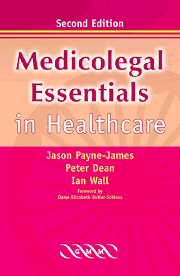Book contents
- Frontmatter
- Contents
- Contributors
- Editors' note for the first edition
- Editors' note for the second edition
- Foreword
- Table of statutes
- Table of cases
- 1 Legal institutions and the legal process
- 2 Human rights and healthcare professionals
- 3 Medical ethics and the forensic physician
- 4 Confidentiality
- 5 Consent to medical treatment
- 6 Professional bodies and discipline
- 7 Complaints in the National Health Service
- 8 The Mental Health Act (England and Wales)
- 9 Death certification and the role of the coroner
- 10 Tissues and organs
- 11 Organ donation
- 12 Living wills
- 13 Euthanasia and end-of-life decision-making
- 14 Abortion and reproductive health
- 15 The Children Act 1989
- 16 Clinical negligence
- 17 Legislation for medicines and product liability
- 18 Clinical trials: ethical, legal and practical considerations
- 19 Medicolegal implications of blood-borne viruses
- 20 Healthcare professionals in court – professional and expert witnesses
- Index
7 - Complaints in the National Health Service
Published online by Cambridge University Press: 12 January 2010
- Frontmatter
- Contents
- Contributors
- Editors' note for the first edition
- Editors' note for the second edition
- Foreword
- Table of statutes
- Table of cases
- 1 Legal institutions and the legal process
- 2 Human rights and healthcare professionals
- 3 Medical ethics and the forensic physician
- 4 Confidentiality
- 5 Consent to medical treatment
- 6 Professional bodies and discipline
- 7 Complaints in the National Health Service
- 8 The Mental Health Act (England and Wales)
- 9 Death certification and the role of the coroner
- 10 Tissues and organs
- 11 Organ donation
- 12 Living wills
- 13 Euthanasia and end-of-life decision-making
- 14 Abortion and reproductive health
- 15 The Children Act 1989
- 16 Clinical negligence
- 17 Legislation for medicines and product liability
- 18 Clinical trials: ethical, legal and practical considerations
- 19 Medicolegal implications of blood-borne viruses
- 20 Healthcare professionals in court – professional and expert witnesses
- Index
Summary
INTRODUCTION
While there are now a considerable variety of routes of accountability that a member of the medical profession may be subject to, the most common almost certainly continues to be the National Health Service (NHS) Complaints Procedure given that the majority of consultations in the UK will take place in this context.
There remains confusion amongst doctors as to what constitutes a claim as opposed to a complaint. At its most simplistic, a claim is where there has been a breach of the duty of care owed resulting in harm to that individual whose intention is to obtain financial recompense, as the doctor has allegedly not provided the standard of care provided as defined by case law. In contrast, a complaint has been described by the Citizen's Charter Complaints Task Force as ‘an expression of dissatisfaction requiring a response’. The Citizen's Charter Task Force was created by the Conservative Government of that time and published a report in June 1995 on the handling of complaints in the public sector.
It is not unknown for an adverse incident to initially be dealt with through one of these routes but ultimately to lead to the civil courts in an attempt to obtain restitution.
- Type
- Chapter
- Information
- Medicolegal Essentials in Healthcare , pp. 71 - 82Publisher: Cambridge University PressPrint publication year: 2004

